- Home
- Julie Hyzy
Deadly Blessings Page 3
Deadly Blessings Read online
Page 3
She expected me to ask what she needed. I knew that, but the woman was such a priss that I decided to make her ask for it herself.
I gave her a little smile, resisting the temptation to scrunch my nose, and turned back to Jordan. “Will you be able to get this done by three?”
Jordan avoided looking Gabriela’s way. “Not a problem.” With a nearly imperceptible grin, she took the folder from my hand. That left me with Gabriela, still hovering in the area of my right shoulder.
“Alex?”
Oh, this time we were going to phrase my name as a question.
“Yes, Gabriela.”
“Did Mr. Bassett speak with you about my story?”
They were all her stories. Week after week, feature after feature, it was Gabriela’s visage that took up the screen, commenting and narrating the adventures we investigators had researched for her, explained to her, and coached her through pronunciations for. From the viewers’ perspective, she never took a vacation. We did double duty several weeks a year so that Gabriela could continue reporting the stories, uninterrupted. Local magazine and newspaper interviewers often asked what drove her to push herself. After all, other stations had substitute anchors who were generally well-received by the public.
Gabriela’s pat line was that she’d worked so hard to achieve a bond with her loyal viewers that she would hate to ever let them down.
The truth, I believed, was that Gabriela was afraid of giving up her anchor spot, even for a week. Being in second place in the ratings meant that the powers-that-be were always looking for a way to nudge our numbers upward. Gabriela’s face was synonymous with our station, and I knew she wanted to keep it that way.
She’d taken an unusual interest in the recent replacement of one of the national news anchors who’d done the unthinkable. Taken maternity leave. It was a tidbit that often made it into Gabriela’s conversation. Gabriela wasn’t married, but I knew the fact that another mouthpiece had been so easily replaced bugged her.
“Your story?” I was being difficult, I know, but I swear I wasn’t in the mood to deal with her.
“Can we …” she made a wiggly finger gesture toward my office, and scrunched her nose, yet again.
I sighed. “Sure. C’mon in.”
Actually, me positioned behind my organizationally challenged desk and she across from me, wasn’t a bad setup at all. Half-turned toward the window, I could appear to be paying attention and still watch the little boats go by on the river in my peripheral vision. Leaning back, I watched Gabriela talk without really hearing her. Until she added, “… which is another reason why we think you’re the best one for this story.”
“Say that again?”
She had the decency to shoot an embarrassed smile. “Well, it isn’t as though you’re, you know, big into image or anything. Not that that’s bad.” She tucked a perfect hair behind a perfect ear with a perfectly manicured acrylic nail. I’d had fake nails, once. Never again. Felt like I was typing with tiny shoes on my fingers.
Still, I wasn’t clear on what she meant, so I leaned forward, elbows on the desk. I thought if I arranged myself into a listening position, maybe I could corral my wayward thoughts into behaving. “We’re supposed to be doing an expose on hair salons …” I affected a dramatic tone, “… and the devastating effect mistakes can have on their clients.” She didn’t seem to enjoy my humor. “Bass told me you had some acquaintances lined up for me to interview. Women who had some really bad hair days.”
It was her turn to lean forward. Even though my door was closed, she lowered her voice, like we were girlfriends about to share some delicious secret. “Well, of course, that’s the focus, but Mr. Bassett and I discussed this at length. We thought it would be so much more exciting if you went undercover and visited a few of these places, you know, to see how they operate?”
I shook my head, “Bass wants me to go ‘undercover’?”
“Well, it was my idea, actually, but Bass loved it. Not just because you could get so much more information that way, you know, that ‘in-depth’ stuff you’re always so excited about, but because the station would be paying for you to visit these salons, and …” she grinned one of those cat-that-ate-the-canary smiles, “you’ll be getting all these free makeovers at places. Maybe you’ll be able find a look that suits you.”
Her triumphant smile attempted guilelessness. Failed.
I hate the feeling of knowing that if you just had a couple of extra seconds you could come back with a perfect retort. I suspected that my mouth hung open. While I knew it was trying to form those witty words, it was more likely looking like I didn’t comprehend.
“Here,” she thrust a paper at me. A sheet of her personal stationery, heavyweight, cream color, with her name in deep blue script centered at the top. I remembered when she ordered it. When the first batch came in, she’d stormed into Bass’s office waving a stack of them, screaming something about having ordered “Midnight Blue” not “Navy Blue.”
Whatever shade this was, it was wonderful. I held it up to the light. Watermark and everything. Maybe I could talk Bass into ordering me some of this stuff.
“That’s a list of all the salons I want you to visit.”
I did a quick count. “There are ten places on this list.”
“And these,” she handed up yet another personalized page, “are the people you need to interview. It’s such a shame.” She shook her head, staring at the paper till I took it, “So much suffering.”
I tried to detect humor in her delivery. None whatsoever. This was the woman who sat at the anchor desk and reported mass murderers, child molesters, and global terrorism. Weekly. And her eyes were getting glassy over bad haircuts?
There had to be twenty names staring up at me. She provided phone numbers, both home and cell for each, along with e-mail addresses. I fought and won a small victory over my emotions—restraining myself from rolling my eyes.
She was sitting on the edge of her chair. Just itching for a fight; I could tell.
But then again, so was I.
The manila files in the center of my desk were chock full of information on Milla Voight, Father de los Santos, the priesthood, and Brazil. I placed the two sheets of information from Gabriela with them, one atop the other, aligning the papers’ corners with the tips of my fingers. Movements this precise usually heralded an explosion on my part.
“Tell you what,” I said attempting a reasonable voice, but coming across more like I was teaching English as a second language. “I’ll look over these lists and pick out the ones that look the most promising, okay?”
“I worked hard getting that information together.”
“I’m sure you did. And I appreciate it.” I detected a slight relaxation on her part as I lied, easily. “Let me spend some time doing research before I come up with our guests, okay? You know this will take time and we’re not going to be able to broadcast interviews with this many women, or salons. Not in one show.”
I knew what she was going to say, so I interrupted, “And I don’t think Bass is going to be up for a two-parter.”
Nose-scrunch again, but she smiled this time, uncrossing her legs and standing up. “Okay, I know you usually do a pretty good job, but I thought you might like just a teensy bit of help. Especially since you lost that big story.”
This time I did roll my eyes.
“Too bad, but isn’t it kind of ironic?” Gabriela said.
I never would have imagined Gabriela using “ironic” in a sentence. “How so?”
“Well that girl who got murdered was a hair washer at a salon. Not one of these, of course,” she said as she tapped the paper in front of me. “But this new story is about disasters at hair salons. I’d have to say that hers was probably one of the worst disasters of all.”
Worst doesn’t begin to describe it, I thought, as she left.
I looked at the list of salons she’d given me. Murdered Milla Voight’s salon hadn’t made this cut. But that didn’t mean I
couldn’t start my hair investigation there.
Chapter Three
I stood outside the Hair to Dye For salon at ten-thirty Tuesday morning. Just a few blocks off the intersection of Chicago Avenue and Rush Street, it was considered near-north rather than downtown. The hand-lettered, “Mowimy Po Polsku” sign in the window was unusual. I found it odd that they would advertise speaking Polish in such an urban and trendy area. I was also surprised by the salon’s nondescript presence on the bustling street.
I mean, I heard of hiding your light under a bushel basket, but this was ridiculous. I passed it twice before the process of elimination of addresses left me no other option. Not that it was shabby. On the contrary, it was a gem, a converted two-story brownstone, with potted geraniums atop the wide concrete arms of the cement stairs. The two floors above sported window boxes efflorescent with colorful trailing petunias despite it being October. As much as I enjoyed the color and brightness of the flowering display, part of me longed for the cool crispness of fall. The way things were going, however, we’d probably skip it altogether and head right into the bite of winter.
What had once been the garden apartment, set below sidewalk level and protected by black wrought-iron fencing, was now the salon. There was no sign on the street to direct pedestrian attention downward. Maybe they got enough business that they didn’t need people to notice them. For my own sake, I hoped so. I was about to put my hair in their hands.
I noticed a gate in the wrought-iron. Its squeak made me wince. Narrow, stone encrusted steps led downward into the garden of the apartment. Really, it was no more than a small patch of lawn. Ten-by-ten at best.
As I approached the picture window front of the salon, I was struck by the image of mannequins coming suddenly to life. The staff, all young, all attractive in a Barbie doll way, their skin clear, their hair perfect, their bodies curvy but slim, had been virtually immobile until they spotted me. Like one of those old-fashioned boxes with figures inside. Put in a quarter and watch them move.
The image wasn’t contradicted, even as I pulled open the glass door to ringing chimes—one of those bell-sets they hang on the opening mechanism. I would have expected something more state-of-the art. But it gave the place charm.
As peroxide and hairspray smells swirled up to meet me, I noticed that the girls’ movements were off. Like I was hearing music in my head, and they were struggling to keep with the beat. One had been sweeping, two others leafing through magazines. Another behind a high counter, about to scratch her head. Or so it seemed. They all had stopped, and now that they moved, they looked at me. If I read their expressions right, they were surprised, and curious. Like clinker notes clumsily hit in the middle of a familiar song, something was not right; I couldn’t put my finger on it.
A young woman with chunked magenta streaks in her long blond hair, smiled at me as I rested my elbows atop the counter between us. “I have an appointment,” I said, giving her my name.
“Yes, I have it here.” While her English was clear, she spoke with an accent that could have either been Polish or Czech. Her bright blue eyes looked up at me with a quizzical look. “You are Alex?”
I nodded, wondering if this girl had known Milla Voight. Even though I was off the story, her murder was still fresh in the newspapers, and I wanted to see if there was anything I could learn. Milla had been employed here from the time she’d arrived from Poland till the time of her death. Surely she’d made a friend or two along the way. With any luck I’d get a little more information about the girl whom I hadn’t had the chance to know.
The shop consisted of two aisles, a front reception area where I stood, and a back place which, when I craned my neck a bit, I could tell housed three washing sinks. The aisle to my right was lined with dryers, the one to my left—seven stations with those cool chairs that spin, raise, and lower with the touch of a foot.
There were a couple of other clients, one of them sat at a station deep to my left. Her white hair was being set in scratchy-looking rollers, kept in place with long pink plastic pins that had gone out of use in the seventies.
Even as the counter girl walked me over to the white vinyl and chrome chairs lining the window, I knew that this was a silly venture on my part. What was I going to do? Find some key piece of information and hand it over to this new guy Fenton? Not a chance on that.
But what other options did I have? In my personal fantasy, I would walk in with some great human interest angle on the story of Milla’s murder and demand that Bass return the story to me. Once he saw the in-depth investigation I’d done, he’d have no choice but to give in, and I’d be looking at a shot at the coveted Davis award.
The girl handed me one of those oversized hardbound books. Not a lot of pages, but every single one had some gorgeous model looking impossibly fabulous in a wacky hair style—the kind that if I wore them, would make small children shriek with laughter and think I was about to make a little doggie for them out of balloons.
I sighed; the magenta-streaked blonde said, “You like it?”
I had turned to a page featuring a stunning redhead with hair piled up on her head, a lot like the style mom-types wore in the fifties for a night on the town. This redhead, whose photograph was so close up that her pores should have come up the size of dimes, had the most flawless complexion I’d ever seen. The hairstyle was awful, but on her it looked great.
“Yeah,” I said, with a laugh, “if I looked like her, I suppose I would.” The girl grinned, which I took for comprehension and a sharing of the joke, but when she returned to the phone, she spoke only Polish.
Little did she know, with my dark hair and freckles, that I could understand every word, as she discussed schedule conflicts and trading days off.
Most of the girls were pretty, all with that indefinable quality that let me know that they were foreign, even before they opened their mouths to speak in heavily accented English. I found it interesting that there was this cache of Polish folk in this snazzy area, and they were making a go of it. According to the information I’d gleaned, the Hair to Dye For Salon had been in business under the same owner for the past seven years.
At a movement to my immediate left, I looked up. A slim, dark-haired girl stood, her head half-bowed. Wearing fashionable too-short black flare pants and a tight black silky shirt that exposed her navel, she was one of those “goth” types that I thought had gone out of style in the last decade. No apparent piercings other than her ears, but the dark lipstick did nothing for her pale face.
She lifted her right hand in a way that let me know she wanted me to follow her. No smile, not a word. She was a few inches shorter than my five-foot six, which made her pretty tiny. The hair, a page-boy in a deep maroon, was obviously dyed.
“Hi,” I said, “are you my stylist?”
She turned and shrugged in a way that let me know she not only didn’t understand English, but that she was not about to start a conversation. This was one shy chick.
I was about to try again when, with another little hand movement, she gestured me into a chair by the wash sinks. And then she was gone.
I’m hair-challenged. Always have been. My idea of accoutrement is a rubber band. I like my hair pulled off my face, out of my way. For a while, in my early twenties, I went through this period of hair-worry, investing in hot rollers, two different barrel-size curling irons, and a whole battery of goop to make my hair look natural. I gave up when it took me longer to “style” in the morning than it did for me to commute. Plus the fact that any wind, any rain … heck, even the thought of rain, made my locks go straight and lifeless.
Right now, my hair, chestnut brown, was just past shoulder length. Perfect for rubber-banding in place. If I was going somewhere fancy, I simply side-parted it and let it hang. Someone once told me that I should go shorter, and that bangs would help camouflage my high forehead, but I liked it simple. And my hair was exactly that. Despite Gabriela’s insistence that I could use a new look, I wasn’t willing to suffer t
hrough more than a trim for the benefit of one of her stories.
Several girls were still sweeping the floor, although it seemed to me it was already clean enough to eat off of. The white of the tile sparkled, but broom after broom continued to sweep invisible dirt away. Two girls were cleaning the mirrors. Again, they were spotless, but still were being shined and polished as though to get them cleaner.
Other girls straightened magazine racks and hair care displays, taking each bottle and jar down one at a time to dust, then replace it on the now cleaned, clean shelf.
I wondered how they could afford to keep such a large staff on duty all day. And why they chose to. These women clearly had nothing to do, and yet they didn’t sit down to gossip; they worked as they gossiped. Must be why the prices were so high.
They spoke in Polish, some of them racing through conversation in a dialect I couldn’t quite follow. I’d been raised on my parents’ English-bastardized version of the language.
“Hallo,” a voice behind me said. I turned to greet a young woman, about twenty-four years old. She must have come from the back room, because I hadn’t seen her before. She was a bigger girl than I was; she had me by about three inches in height and at least thirty pounds in weight. But she carried it well. Like Marilyn Monroe, she had a voluptuous, curvy look. And like Marilyn, she was an attractive girl. Until she smiled.
She tried to keep her mouth closed, but her pronounced overbite and large teeth marred what could have been a stunning face. When she grinned, which she did when I said “hi,” her whole face lit up, and the pink of her rounded cheeks deepened. I liked her immediately.
“I am Sophia,” she said with a little lilt, like a question, as she pointed to her chest.

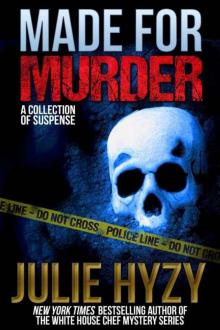 Made for Murder
Made for Murder Grace Among Thieves
Grace Among Thieves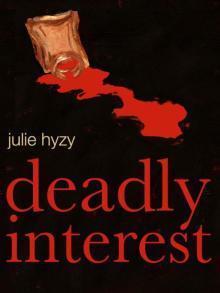 Deadly Interest
Deadly Interest Deadly Blessings
Deadly Blessings All the President’s Menus
All the President’s Menus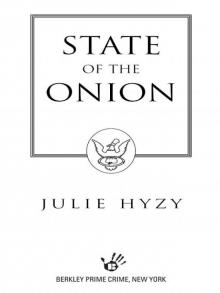 State of the Onion
State of the Onion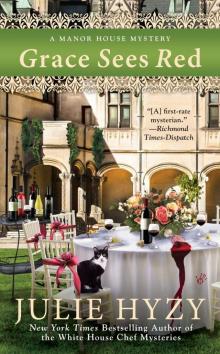 Grace Sees Red
Grace Sees Red Whitehouse Chef 04 - Grace Under Pressure
Whitehouse Chef 04 - Grace Under Pressure Hail to the Chef
Hail to the Chef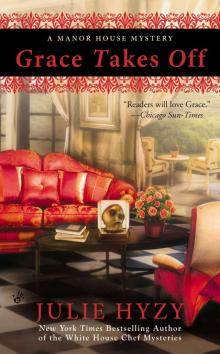 Grace Takes Off
Grace Takes Off Grace Against the Clock (A Manor House Mystery)
Grace Against the Clock (A Manor House Mystery) Grace Cries Uncle
Grace Cries Uncle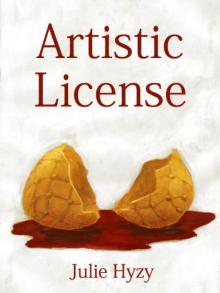 Artistic License
Artistic License Eggsecutive Orders
Eggsecutive Orders Grace Interrupted
Grace Interrupted Affairs of Steak
Affairs of Steak Fonduing Fathers
Fonduing Fathers Foreign Éclairs
Foreign Éclairs Virtual Sabotage
Virtual Sabotage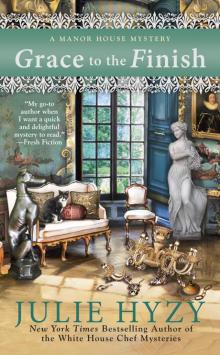 Grace to the Finish
Grace to the Finish